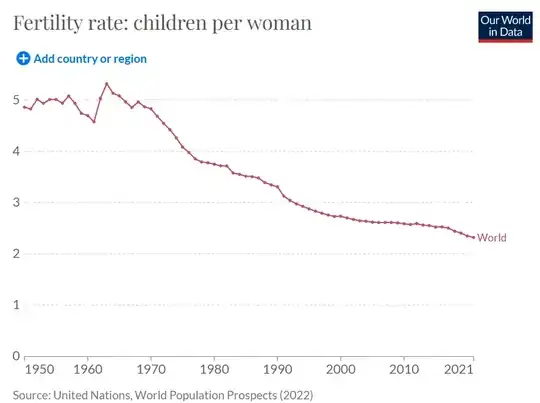JD Rucker claims that a falling birth rate is the result of reproductive damage caused by Covid-19 vaccines. However he does not say if he means all the vaccines or just some of them: none are specifically mentioned.
The claim seems to be centred around the news that Australia's birth rate in the first three months of 2023 were the lowest on record, and that it is not just Australia. I'll start by putting that into a broader context.
It is well known that the global birth rate has been falling for over half a century, as reported by (among many others) BBC News in 2020:
Fertility rate: 'Jaw-dropping' global crash in children being born
In 1950, women were having an average of 4.7 children in their lifetime... Researchers at the University of Washington's Institute for Health Metrics and Evaluation showed the global fertility rate nearly halved to 2.4 in 2017.
It is substantiated by this graph from Our World in Data

If you hover over the original graph you can see the year for each node, and from 1968 until 2021 there was a fall in the birth rate in most years, with a small rise in some. But it doesn't deal with any affect of Covid vaccines, because there is about 2 years lead time from the 2019 outbreak of Covid-19 due to vaccines being developed and gestation.
There has, however been research into the possibility of the Covid-19 vaccines causing reproductive problems.
Here is a study published in 2022 by the Elsevier journal Vaccine and made available by the National Library of Medicine.
The impact of COVID-19 vaccines on fertility-A systematic review and meta-analysis
Background
Despite literature’s evidence about COVID-19 vaccines' safety, concerns have arisen regarding adverse events, including the possible impact on fertility, accentuated by misinformation and anti-vaccine campaigns. The present study aims to answer the question: Is there any impact of COVID-19 vaccines on the fertility of men and women of reproductive age?
. . .
Conclusion
Based on the studies published so far, there is no scientific proof of any association between COVID-19 vaccines and fertility impairment in men or women.
And here is another article from the National Library of Medicine in 2022.
COVID-19 vaccine - can it affect fertility?
Abstract
Headlines have appeared across multiple social media platforms questioning the effects of newly authorised COVID-19 vaccines on fertility. Although the effects on future fertility were not studied in the initial trials, at present, there is no evidence that the COVID-19 vaccine has any effect of future fertility. It is well known that pregnant women are at a higher risk of complications associated with COVID-19 such as ICU admission and death, and there is a rare but tragic increase in placentitis and stillbirth, highlighting the importance for those planning a pregnancy any time in the future to be vaccinated. Here we summarise international consensus from multiple organisations advising on fertility and the COVID-19 vaccine. Preliminary studies all suggest that there is neither link, nor indeed any theoretical reason why any of the COVID-19 vaccines might affect fertility. Dissemination of misinformation regarding the impact of the vaccine on future fertility needs to be controlled in order to avoid any hesitancy amongst young women attending for vaccination. It is also vital that the medical profession counteract this information, and, in order to do that, healthcare providers must be well informed on the latest recommendations and research.
What these articles say, is that
there is no scientific proof of any association between COVID-19 vaccines and fertility impairment in men or women
there is neither link, nor indeed any theoretical reason why any of the COVID-19 vaccines might affect fertility
Although it might be early days to draw a definite conclusion, JD Rucker's claim is a generalisation based on his own self-confessed lack of knowledge, and a "prima facie apparent cause", which means he has not actually investigated its truth.
In other words, the claim is groundless.
